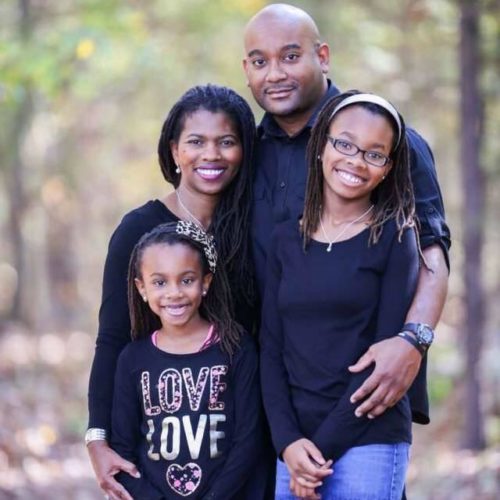When you were a child, what was your response to this question: “What do you want to be when you grow up?”
My father, a dentist, had his own private practice in Roxboro, and my sister and I were his dental assistants. So we observed people, how they presented themselves when they came to the desk, their financial hardships. And my mom was a case manager (in addition to being a school teacher). She would bring us with her to visit clients she’d placed in nursing homes and senior living facilitates. That was the norm for us, and it made me interested in health care. Ultimately I decided I wanted to be a therapist or counselor, and even completed a high school research project on the factors that contribute to relationship decisions in teens.
RESEARCH IN 5 WORDS:
“Mindfulness and compassion reduce stress.”
Share the pivotal moment in your life that helped you choose your field of study.
During a clinical internship while attending North Carolina Central University, I observed patients and the factors that contributed to their mental health problems. I was intrigued how the team assessed one patient in particular, an African-American woman. For me, she was familiar — like my piano teacher or my aunt. I didn’t see her just as a patient, therefore the questions I would have asked her were different. I was frustrated by that. This was a great team of people and a diverse team of healthcare providers — it’s just they may not have had exposure to or weren’t trained for treating that culture. But that’s when I began thinking about culturally relevant health care provision. I decided I wanted to be a research psychologist to understand more about the factors that contribute to what we see in people and how to help other people see that so they can provide the best care.
Tell us about a time you encountered a tricky problem. How did you handle it and what did you learn from it?
I used to get frustrated when I had to write and revise my papers and proposals because I could have used that time to directly help people instead. But I eventually learned it’s not just about what you can do in an eight-hour day with your own hands. Your research has the potential to reach people around the nation and the globe, multiplying your capacity to help others. Just last month, for example, I decided to transition out of an administrative position during this season of my career for that very reason. There’s a lot more that I want to do with my research, practice, and teaching scholarship — things that are important for me to focus on and finish. As much as I loved that role, I don’t want to lose momentum in my research, and I feel that I can take on more leadership roles once I become a tenured full professor. It wasn’t an easy decision to make, but I am certain it was the right one.
What are your passions outside of science?
My family — my husband and two daughters, who are 9 and 12. Both of my parents are from North Carolina, and we can trace roots on both sides to my grandparents’ great-great grandparents. Those branches still live in the same general community — one’s from Charlotte and one’s from the Lake Gaston region. So we are all passionate about family bonds.



